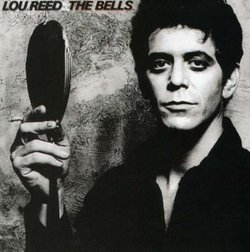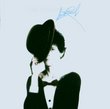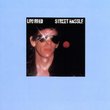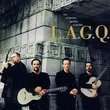| All Artists: Lou Reed Title: Bells Members Wishing: 3 Total Copies: 0 Label: Sbme Special Mkts. Release Date: 3/1/2008 Genres: Folk, Pop, Rock, Classic Rock, Metal Styles: Singer-Songwriters, Album-Oriented Rock (AOR) Number of Discs: 1 SwapaCD Credits: 1 UPC: 886972503325 |
Search - Lou Reed :: Bells
 | Lou Reed Bells Genres: Folk, Pop, Rock, Classic Rock, Metal
1992 Arista reissue of his 1979 album for the label, considered his strangest effort since 1975's 'Metal Machine Music'. Nine tracks, including 'Stupid Man', 'Disco Mystic' and 'I Want To Boogie With You'. |
Larger Image |
CD DetailsSynopsis
Album Description 1992 Arista reissue of his 1979 album for the label, considered his strangest effort since 1975's 'Metal Machine Music'. Nine tracks, including 'Stupid Man', 'Disco Mystic' and 'I Want To Boogie With You'. Similar CDs
|
CD ReviewsStreet poet meets jazzbo, with mixed results Ralph Heibutzki | SE Michigan, USA | 07/22/2006 (3 out of 5 stars) "I'm glad to see this album getting its due on CD...being new to Lou at the time it came out, I bought THE BELLS for one reason: Lou's knack for polarizing people, splitting 'em right down the middle (like Bob Dylan, or Neil Young, who've also gone through their own artistic peaks and valleys). I played "All Through The Night" for a friend weaned on Top 40, and he said, "Well, it sounds like he's sick," which only made me laugh: "Oh, well, this doesn't have 'big breakout hit' written all over it, does it?"
On that score, you'll either love this album or hate it, which doesn't bother hardcore fans like me, but proves to be a mixed outcome for the casual listener. The overall vibe is jazzy R&B, although the guitar does come up for air occasionally (notably on "Looking For Love," whose lyrics don't add up to much -- remember, this came during Lou's improv-is-everything approach to recording, and sounds like it). Of the six shorter songs, it's the Reed-Lofgren collaborations that have worn best for me. "Stupid Man" and "With You" swing with an edge missing from many albums made during this era; in many ways, THE BELLS is a worthy showcase for saxophonist Marty Fogel, whose peers fare less well in the mix. "City Lights" is a nifty ode to Charlie Chaplin's exit from pop culture (and not too far removed sonically from Bebop Deluxe's "Surreal Estate"). That leaves a trio of clinkers, notably "Looking For Love" (which I've covered), and "I Want To Boogie With You," sunk by its sluggish tempo, submerged guitar and sketchy, nondescript lyrics...using the catchphrase of the day (i.e., "boogie") is the surest ticket to dating a song (imagine this being recorded with wah-wah and sitar in 1967 as "I Wanna Be Groovy With You"). "Disco Mystic" has some excellent sax from Fogel going for it, but little else (and, when you realize there's nine songs on this album, screams, "Look, Ma, short on material"). I preferred the trio of songs that graced side two of the old vinyl: "All Through The Night" is a pretty intense affair, from a lyric standpoint (bolstered by an unlikely horn hook from Fogel), and I always had fun trying to figure out what was being said in the overdubbed background chatter. "Families" has the best mix, sonically speaking, and works well as a retort to those ever-disapproving familial presences in Lou's life (I've always laughed about the line where he says, "Papa, I'm not getting married...and no, there's no grandson planned for you"). The nine-minute, sprawling title track closes out the album in truly grand, if inconclusive fashion: to those who have never heard it, I can only describe it as Gothic jazz...built around a three-note bass riff, Don Cherry's piercing trumpet, and beds of swirling keyboards from Michael Fonfara. I've dug it, though some tighter editing would have helped (even if its lyrical drift -- "It was really not so cute/To play without a parachute" -- is clear enough). I appreciated this album's experimentalism, then and now, but I only wish it could have been mixed better: like most of Lou's output of the time, THE BELLS arrived in the clothes of "Stereo Binaural Sound," which he touted as a significant leap in sound quality. However, the overall sound is murky, and dense, which makes it tough going for the listener. As with many albums of this era, the guiding principle seemed to be: "If you can add it, overdub it," which doesn't always work out. For example, there's a fairly nifty rhythm guitar lick on "All Through The Night," but you'll have to work really hard to hear it. On other tracks, like "With You," it's the opposite problem...the instrumentation swamps the lyrics. Overall, THE BELLS reads like an uneasy compromise between the quest for accessibility, which seems to have been the intent of the shorter tracks, and the "here's a riff, let's go for it" feel of the longer pieces ("Families," "The Bells"). Either way, it fell between two chairs: Arista didn't realize its goal of netting that ever-elusive hit, while longtime fans went back to TRANSFORMER, or CONEY ISLAND BABY, for solace. For all of those issues I've rattled off, however, the better tracks are worth the price of admission; as with GROWING UP IN PUBLIC, don't start here if you're new to the cause." |

 Track Listings (9) - Disc #1
Track Listings (9) - Disc #1

